Статьи журнала - Arctic and North
Все статьи: 972
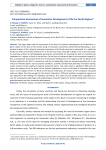
Comparative assessment of innovative development of the Far North regions
Статья научная
The paper deals with the assessment of the level of innovative development of the Northern regions. Based on the data of the annual rating of innovative economies, performed by Bloomberg, a comparative analysis of the rating of innovative economies in the Nordic countries is presented. It is noted that Russia has been consistently ranked 25-27 in the last four years, although in 2016, it was in the 12th place. An overview analysis of methodological approaches and methods for assessing the level of innovative development of a region in Russia is carried out. On the basis of statistical data on the composite integral index, a comparative assessment of the level of innovative development of 17 regions of the Far North of the Russian Federation for 2017 is carried out, and the corresponding ranks are analyzed separately for 5 sub-indices of thematic blocks: socio-economic conditions, scientific and technical potential, innovation activity, export activity and the quality of regional innovation policy. The study shows a significant difference between the regions of the Far North of the Russian Federation in terms of the level of innovative development. In five subjects of the Far North of the Russian Federation, the values of the composite innovation index are higher than the average for the Russian Federation. Different positions occupied by regions are also observed in the rankings for individual sub-indices. The results of such ratings make it possible to assess the comparative advantages and disadvantages of specific regions for further consideration in the program documents on their innovative development.
Бесплатно
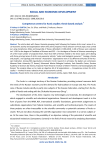
Competence centers for Arctic studies: thesis-based analysis
Статья научная
The article deals with theses thematic grouping, both following the Russian Arctic zone’s areas of socio-economic activity and organizations where they were prepared. Thesis selection on Arctic topics was carried out using morphemes (titles and keywords) of theses defended in 1990-2018. 1.436 of theses were selected, incl. 1.201 for the degree of Candidate of Sciences and 235 - for the degree of Doctor of Sciences amounting to 1% of the total number of analyzed theses. More than 50% of theses related to the Arctic topics were dealing with three principal areas of Arctic socio-economic activity: “water and biological resources”, “ecology, climate and people”, and “geology and minerals”. Researchers’ organizations were located in 51 different territories of the Russian Federation. Among 503 organizations involved in Arctic research on all topics, the leaders are Lomonosov Moscow State University (72 theses), Murmansk Marine Biological Institute, Kola Scientific Center, Russian Academy of Sciences (62 theses), Knipovich Polar Research Institute of Marine Fisheries and Oceanography (43 theses). The analysis allows us to create an objective list of all organizations - Competence centers for Arctic studies - involved in areas related to Arctic socio-economic activity.
Бесплатно
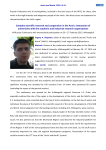
Статья научная
Review of the conference which took place at the Northern (Arctic) federal University (Arkhangelsk) in February 26—27 2015 and was dedicated to various questions of development of the Arctic. Some presentation are highlighted in the review, speaker’s suggestions included in final resolution are represented.
Бесплатно
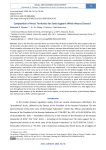
Composition of Arctic Territories for State Support: Which Way to Choose?
Статья научная
Due to the fact that currently there are several lists of Arctic territories for state support, the article describes possible options for changing their composition in the forecast period of the next decade: from complete unification of all lists to, on the contrary, extreme diversification (each list has its own tasks of state support). The research question of the article is to determine the benefits and costs of each scenario for the “set” of Arctic territories for government support. Main results: 1) four scenarios of evolution of the current system of state support of the Arctic and northern territories according to the geographical factor (composition of territories for support) — a) optimal-administrative; b) anti- district; c) polyphonic; d) limited diversity; 2) radical anti-district and optimal-administrative scenarios, comfortable for federal executive authorities, carry the highest integral risks. The polyphonic “evolutionary” scenario carries minimal risks, when, simultaneously with the preservation of the institution of northern regional guarantees and compensation, institutions of the multifaceted Arctic are established — for resident investors, geostrategic, and entrepreneurial. But it also turns out to be the most expensive for the federal budget; 3) for the integral scenario, it is advisable to take into account the following elements of the described scenarios: multiple lists of Arctic regions for different forms of state support; preservation in a limited form of the former regional institution of social support for the northern and Arctic territories; full support for small and medium-sized manufacturing entrepreneurs in the Arctic and North, primarily in areas with limited delivery times for goods; gradual transformation of support for localities equated to regions of the Far North, from northern and Arctic institutions to all-Russian regional ones; introduction of institutions that encourage the technological transformation of the previous industrial structure and the formation of a new digital structure throughout the Arctic zone of the Russian Federation.
Бесплатно
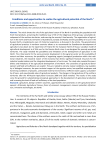
Conditions and opportunities to realize the agricultural potential of the North
Статья научная
The article shows the role of the agricultural sector of the North in providing the population with fresh food products, preserving the traditional way of life of the indigenous ethnic groups, sustainable de-velopment of the northern territories, and ensuring the country's food security. The organization of agriculture in the north and Arctic territories of Scandinavia, Canada and Alaska and the possibility of its use in the Russian North, considering its own rich historical experience, is discussed in the article. The generalization of agricultural practices in northern countries allows us to recommend the Scandinavian development of agriculture and, above all, the experience of Finland for the European North of Russia. Canadian model of agricultural development is of little use for the Russian North since it was designed for sparsely populated territories. The study revealed the possibilities and limitations of the development of agriculture in the North. The critical points for the socio-economic development in the agrarian sector are the availability of natural and labor resources, the possibility of organizing organic (ecological) production within the traditional industries, the industrial nature of the economy that directs significant financial resources for the industrial modernization and the integrated development of rural areas. The study also revealed the possibilities and limitations of the agricultural development of the North. The constraints of agricultural development and food self-sufficiency are explicit. They are related to extreme natural conditions, low availability of biological resources, the poor technical support of the agrarian sector, low-qualified employees and hard living conditions of peasants, unfavorable external environment, inefficient state support, unavailability of loans, and unsustainable sales of agricultural products. The changes in the agriculture of the northern territories after the All-Russian Agricultural Censuses 2006 and 2016 revealed. The results of the study serve the ground for substantiating conceptual approaches to the development of agricultural production and increasing the level of food self-sufficiency of the local population.
Бесплатно
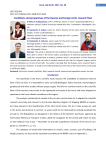
Conditions and perspectives of the Russian and foreign Arctic research fleet
Статья научная
The article is devoted to the conditions of the Russian and foreign research fleet able to work in the Arctic waters according to its technical specifications. The study has revealed that a modern common trend is construction of multi-functional research and expedition vessels, able not only to conduct research, but also to transport cargoes and to serve as icebreakers or carriers of aircrafts. The authors conclude that the Russian Arctic research fleet is the most numerous. However, it needs to be modernized because the most of the vessels were constructed in 1970s and 1980s.
Бесплатно
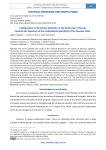
Статья научная
The article publishes the results of the research devoted to the analysis of dominant identities, the position of the population in relation to civic and regional patriotism. Theoretical approaches to analyzing the problem of the relationship between the concepts of “nation” and “patriotism”, as well as the relationship between the configuration of dominant identities and the forms of state formations in the context of this idea are considered. The article presents the results of a questionnaire survey of the population conducted in the spring of 2024 in two regions of Russia — the Republic of Sakha (Yakutia) and the Chukotka Autonomous Okrug. The hierarchy of identities is revealed, the results of the study showed that the Russian identity turned out to be the most significant for the population of both regions. Regional patriotism is more inherent in ethnic groups that have historically inhabited these territories; however, differences were revealed in the regions of the study. In Yakutia, the ethnic identity of respondents of Yakut nationality actualizes the importance of regional rather than ethnic identity, while in Chukotka this tendency is not manifested among Chukchi. The assumption is made that civilizations in the modern world represent a special structure of interaction between the identities of people who are part of it. The specificity of the Russian civilization is that in a multi-ethnic state the ethnic identity, which is institutionalized by the state, is dominant along with the civic identity.
Бесплатно
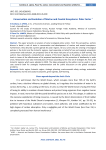
Conservation and Evolution of Marine and Coastal Ecosystems: Polar Factor
Статья научная
The paper presents an analysis of polar ecological policy actors. From this perspective, authors discuss in detail a role of state in conservation and development of marine and coastal ecosystems. Furthermore, they describe a green agenda for polar regions. At last, some ways for creating of ecological policies in the Arctic and the Antarctic regions, most especially on behalf of sea and marginal ecosystems conservation and evolution, are proposed. One of the most vital parts of such policies is staff training. The authors have attempted a comprehensive analysis of the Green Agenda at the global, national and local levels in terms of the effectiveness of its proposed mechanisms for the protection of biodiversity in polar areas. Researchers have also reviewed plans of Russia according to the new set of strategies for Arctic and Antarctic regions, which were adopted in 2020. The ideas proposed by the authors can be used in a real-case scenario both for strategies implementation and for public discussion on the global ecological problems.
Бесплатно
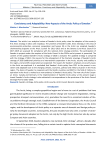
Consistency and Adaptability: New Aspects of the Arctic Policy of Sweden
Статья научная
The article is an analytical review of Sweden’s Arctic policy since the adoption of the country’s first Arctic strategy in 2011 until nowadays. The priorities of Sweden’s 2011 Arctic Strategy in the areas of environmental protection, economic cooperation and human life in the Arctic are analyzed. Sweden’s chairmanship programs at the Arctic Council for 2011–2013 and at the Barents Euro-Arctic Council for 2017–2019 are assessed for compliance with the national Arctic strategy priorities. The participation of Sweden in projects under the auspices of the Arctic Council in the 2010s and at present is presented. The content of the updated Sweden’s Arctic strategy of 2020 is analyzed. The updated strategy is compared with the strategy of 2011; the reasons for the enlargement of the thematic coverage of Sweden’s Arctic strategy of 2020 (additional priorities are international cooperation in the Arctic, security and stability in the region, and scientific cooperation) are explained. The reasons for Sweden’s emphasis on security issues in the Arctic are explained. It is concluded that Sweden’s Arctic policy from 2011 to the present is consistent and adaptable due to the changing climatic, economic, political and military situation in the Arctic region. The desire of Sweden to cooperate with the Nordic countries and NATO in the field of military cooperation in the Arctic is marked as a new tendency in Sweden’s Arctic policy. The new role of the European Union, Canada and Germany in the implementation of Swedish Arctic policy at the present stage is traced. Sweden’s Arctic strategy is also estimated in correspondence to the provisions of the Arctic Council Strategic Plan for 2021–2030.
Бесплатно
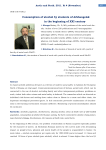
Consumption of alcohol by students of Ar-khangelsk in the beginning of XXI century
Статья научная
In clause (article) problems deviance as criterion of modern social safety in habitats the European North of Russia are discussed. Communication(connection) of Serious social harm which can be connected to the use of alcohol, including family and other interpersonal problems, problems on work, violent both other crimes and social safety is deduced. The researches which are directed on individual risk factors and settling down rather close to illness in a cause and effect chain, the important sociological processes ignore. In this connection preventive maintenance of drunkenness in the learning environment remains ineffective. Monitoring of process alcoholization should be continued.
Бесплатно
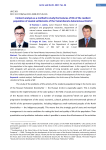
Статья научная
The authors discuss the methodological approaches to the assessment of the level and quality of life of the population. The analysis of the scientific literature shows that in most cases, such studies are based on the basic statistics. The results of such studies give rise to some controversy related to the fact that at a fairly high standard of living, determined by a statistical method, the actual level of satisfaction of the population in the region, determined by other methods, is estimated lower. In this regard, the authors offer alongside with generally accepted methods of living standards and quality assessment of the population, to use the method of content analysis, which can be also used to identify the real problems of life of the resident population of coastal areas in terms of industrial development of the Arctic region.
Бесплатно
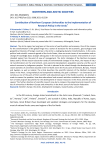
Статья научная
The Arctic region has long been at the center of world politics and economy. One of the reasons for the transformation of the global fringe into a center of attraction for the economic, geo-ecological and geopolitical interests of foreign countries is the Arctic is undergoing dynamic transformations. In the socio-political and scientific research agenda of the Arctic States, there are acute issues of accumulation and exchange of knowledge about changes taking place in the natural and socio-economic environment of a non-standard region from the point of view of management. The Arctic strategies of the Northern European States seek to fill the vacuum about the trends of environmental changes in the Arctic, the impact of natural transformations on the environment, socio-economic development, population security, and the use of natural resources by indigenous peoples. This task is planned to be solved through the development of research activities of universities located in the Far North and in the Arctic zone of Denmark, Norway, Finland and Sweden, as well as Iceland. The article describes the scientific interests of the Northern European States in the Arctic. Using analytical and comparative methods, the goal is achieved - to characterize universities as one of the parts of their scientific and educational space in the Nordic countries. An attempt is made to answer the question: how does educational and research activities contribute to the implementation of state program documents for the development of natural resources in the Arctic and the use of its spaces? The further direction of scientific research may be to compare the educational and research activities of universities in Northern Europe and universities in the Arctic zone of the Russian Federation.
Бесплатно
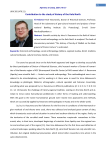
Contribution to the study of history of the Kola North
Статья научная
Scientific activity by Irina A. Razumova in the field of historical and social anthropology on the Kola North is analyzed. The book of documentary materials "The History of Family of Zhidkih on the Background of Pomor Culture" is estimated.
Бесплатно
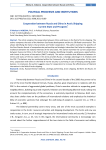
Cooperation between Russia and China in Arctic shipping: current state and prospects
Статья научная
The article analyzes the cooperation between China and Russia in the field of Arctic shipping. The author compares the tasks of the Northern Sea Route development and the Ice Silk Road construction. This allows identifying the factors that promote and hinder cooperation. The author examines the specifics of the Sino-Russian format of comprehensive partnership and strategic interaction that helps to mitigate contradictions between the national interests of the two states. The author examines the current cooperation between Russia and China in the field of Arctic shipping, identifying strengths, weaknesses, opportunities, and threats in key areas of interaction (SWOT analysis). The author concludes that differences between interests and status of the two states in the Arctic provides Russia a strategic advantage in its relations with the PRC. This balance may be maintained within the framework of a multilateral cooperation. At the same time, cooperation with China in the field of marine security is promising in case of keeping existing power balance. In conclusion, the author suggests areas for cooperation to increase the effectiveness of bilateral interaction in the field of Arctic shipping.
Бесплатно







